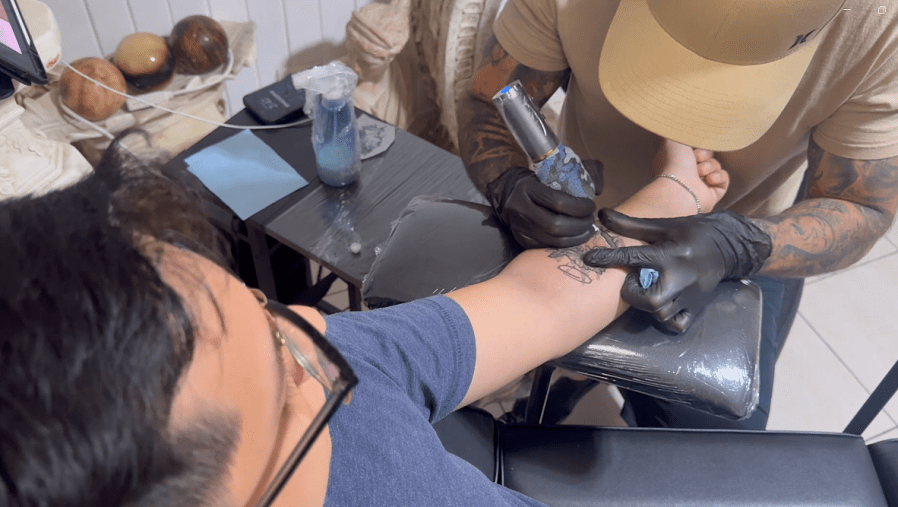JUAREZ, Mexico (Border Report) – U.S. residents often cite lower prices and personalized attention when asked why they travel to see doctors and dentists in Mexico.
The same holds true for tattoo artists.
“I came to get a tattoo done in Mexico because of the prices and because I love the people,” said El Paso insurance salesman Jair Carrillo. “I love the art they are making here. I just feel more comfortable here.”
Carrillo drove to Juarez last week and spent two hours in a chair getting the head of a Roman emperor tattooed on his forearm. The image symbolizes achievement but also is a reminder that life can bring you crashing down to earth at any time.
Tattoo artist Adrx Martinez says many of the customers walking into his studio in a commercial strip near Zaragoza live across the border. There are plenty of tattoo shops in El Paso and elsewhere in the U.S., but the clients like the one-on-one, no rush approach they get in Juarez.
“At first I thought they came here because of the prices, but then you realize it’s because of the trust they develop with the artist and sometimes it’s because of the specialty of the artist,” Martinez said.
Picking an image – a face, a cross or a rose, etc. – is just the beginning. What happens during the next two to three hours is a conversation about detail. Will the desired image fit well in the desired body part? Do you want color and how deep the hue? And, most often, will it hurt?
“That depends on the size, how much color you want […] and what part of the body you want the work on. Close to the bone, like the knee or ribs, will be painful. Joints, nipples and (private) parts would be painful,” Martinez said.
The cost depends on the complexity of the image and time involved. Martinez said his starting price is 2,000 pesos or around $100. He’s been doing tattoos for seven years.
In the U.S., tattoo artists often charge by the hour and fees may vary according to the artist’s experience. Full “sleeves” can cost thousands of dollars, according to several online forums consulted.
Tattoos in the era of cartels
There also are considerations unique to border locations. Whereas large tattoos of piled up skulls, a cluster of falling stars or a grinning skull with a big Mexican hat might not raise eyebrows in the U.S., they might be misinterpreted in certain circles in Mexico.
“It varies from city to city. If you are not from Juarez, you have to ask if (the image) is not related to a gang or a cartel,” Martinez said. “That may not only get you in trouble with the authorities who may see you as suspicious, but also with one group or another.”
The Mexican cartels have appropriated distinct cultural symbols such as fierce Indigenous warriors and stylized versions of the eagle-eating-a-serpent national symbol, according to researchers and U.S. law enforcement.
Beware of numbers. Tren de Aragua allegedly has appropriated Michael Jordan’s famous 23; various Mexican and Central American gangs love 13 and 18.
On a lighter note, Martinez urges caution when tattooing somebody’s name to your body. Unless it’s your mom or your children – who will always be your mom and your children – you may live to regret inking a romantic partner’s name on you.
“You may tattoo the name of your partner today, and two to three months later you might be back to cover it up,” the artist said, adding he’s accommodated several such cases.
Cultural, generational considerations
Carrillo, who’s of Mexican heritage, said he’s aware some older relatives still chastise their grandchildren for getting tattoos. But he lives in the U.S. and says he has never felt a stigma for his previous three tattoos.
“I feel people are getting more comfortable with tattoos. I don’t feel discriminated because of my tattoos,” he said. “Little by little we’re getting used to seeing teachers with tattoos, doctors with tattoos. It has nothing to do with what they do.”
Still, when he meets with older business owners, he makes sure his shirt is buttoned up and no tats are showing.
“It’s not a big deal. It’s not like I’m selling drugs,” Carrillo said.
According to a Pew Research Center 2023 study, almost one in three Americans have a tattoo and 22 percent have more than one.
Several Juarez tattoo artists rely heavily on internet marketing to get clients from both sides of the border. There’s nothing wrong with that, Martinez said, but he urges anyone considering a getting a “tat” to formally research or at least get word-of-mouth on how safe and reliable the artist they will be visiting is.
ProVideo contributed to this report.
